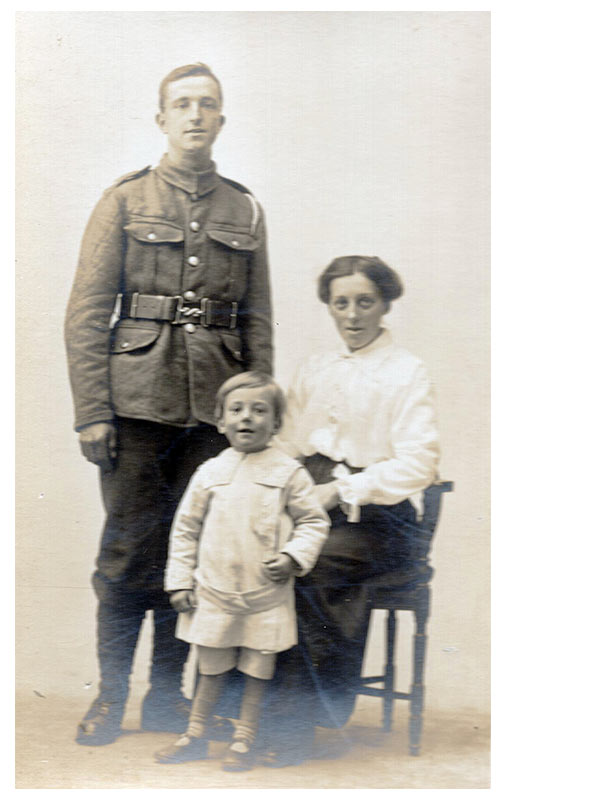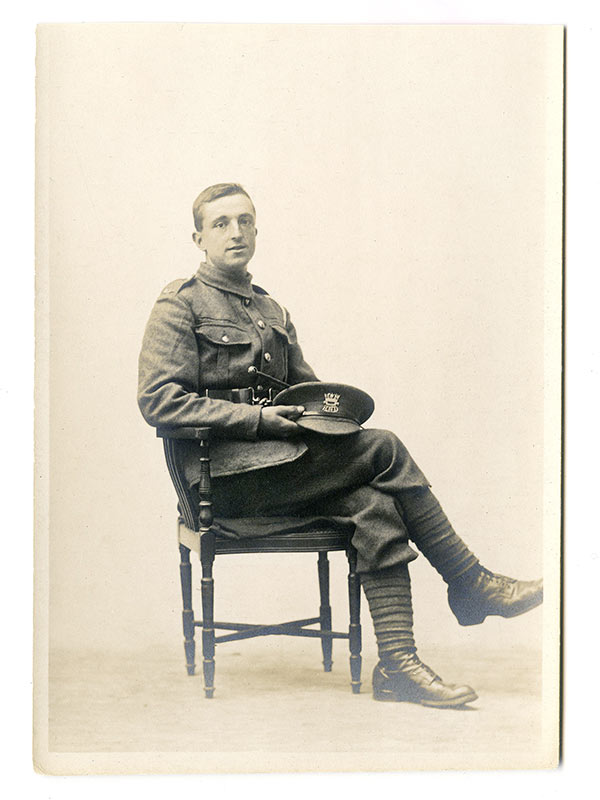Subtotal: $
Checkout
Arthur Woolston, a young British father, was called up to fight in World War I in 1917. He trained at Blandford, Dorset, England; from there he was sent on to France, where he fought in the trenches. On December 5, 1917 he received news that his second son had been born. Arthur was killed by a shell on March 25, 1918. At the end of the war, the British government sent his wife a large bronze medal inscribed with the words, “He died to save civilization.” But Arthur’s letters, written in simple, local dialect, show no such grandiose delusions.
Sept 10, 1917
Dear Evelyn and the boy,
Some started learning Louis guns this morning, others rifle grenades, so that makes me think that we shall get a fortnight at it. You say you don’t think Artie had better have any cartridges, they are only empties they would do to play with. As for being a soldier, I shall do all in my power to keep him from a lot like this. I hope he will learn a trade that will keep him from it. A chap in our tent only said yesterday he will see none of his children comes in it …
Oct 20, 1917
My dear wife and Artie,
We set off again yesterday for another train journey. We marched down to the station and it did weigh. I can tell you it’s enough to break our backs. We had rounds of ammunition to carry as well. It’s a job to lift it on our backs. We started from the station about dinner time and got to the station where we were to get out at seven o’clock. We had to march about eight miles or more to get to the place where we were putting up at. I don’t know how we got there. It’s the worst go I have had. I were beat by the time we got there. We never seemed to get any nearer. Everyone we asked kept saying the same so we didn’t seem to get any nearer. We had to rest four or five times so you can tell we were glad to drop down anywhere. …
We arrived here about twelve. They put us in barns. There are about forty or fifty in this one, we had no blanket or anything and we were starved. We are experiencing something now. We can hear the bombardment from here, some of our chaps got left behind and the rations too. We have had only two biscuits and bully beef all day today. I had four packets of cigarettes given since I have been out here. I give most of them away. They are twice as cheap out here …
You are all in my mind, after all our hardships I look on the other side of seeing you again shortly when this is over. …

The author with his wife, Evelyn, and son Artie
Dec 5, 1917
Dear Grandad and everybody and Evelyn and the children,
I were very pleased to hear from you and to hear that Evelyn is over the stile now. I am pleased to hear both are doing well and I do hope they will, fancy a boy. I daresay Evelyn would have liked a little girl and I wouldn’t have minded. I should never like to think little Artie and the youngster would ever become a soldier, they never will if I can rule. … Let Evelyn have all she needs, never mind about money. She knows where there is plenty and she can have as much as she wants … I should have loved to have been at home and it was my place. It’s a downright shame that we should have to be away. I shall look forward to the time of coming home more and more. …
Jan 11, 1918
We have had a rough time since we have been here. I think it had been a bit quiet until we got here. My word we did get a shelling on the 30th. I shall never forget it. I shall have plenty to tell you when I come home. We lost about half the battalion. I think they were bent on making a big advance but they didn’t succeed. I think we can get through anything after that, it’s enough to wreck anyone’s nerves.
We are having terrible weather for the trenches, my word it’s freezing, fancy being out all night in this weather, don’t know what to do with our feet. I am pleased we have come down for a day or two it’s time we had a rest but we are still in reach of shell fire. We have such a job to walk after being so cold, just as we are getting warm it takes effect …
I am longing for the time when I shall be with you all again … I hope the leave I get will be to stay, and may it soon come. I shall do my part after this and I don’t think I were bad before always at work but this will alter many a man. Some will be worse but I kept straight through it and mean to. I shall prosper in the end … It is about over shoe tops in mud and water today. God help them in the trenches. …
Jan 12, 1918
We hear all sorts of rumors about peace and such like and when we shall be relieved but it’s no use taking it in. We have to wait. Nothing certain in the army. …
My word we have [to] do things here that we should carry on about in civil life, such donkey work. All we can do is grumble and do it. It makes you feel that you don’t care for anything, it does fetch it out of you. When I read the letters and think of you all it touches me. I could have a good time, but I do hope it will soon be over. I am longing to be home again. I don’t wonder the war costing so much, there is so much wasted, some things you could well do with. I have a rare cold. I hope you will send the gloves as soon as possible, my coat is thick in mud. I can’t get it off but we are expected to keep clean. It is over shoe tops in mud today.
Jan 24, 1918
The first day we had in supports, well when we got there there were no where to get shelter and the trenches were terrible with mud. … We walked right to the trenches on the top so you can see, fancy that they say they are Saxons in the front we were in and they don’t want to fight. It were impossible to think about fighting under such conditions. We had to lunge on the side of the trench all night it did seem a long night. The next morning when it were light Fritz were walking about on top just as if there were no war on. He shouts out good morning boys, he were not more than twenty yards from us in his trench. …
Later on several of Fritz’s came and sat in our trench against us and started talking and giving us souvenirs. They looked very bad. They are fed up with it, they love to get hold of a piece of our bread. They don’t like theirs much according to what they said. We said German bread good, they said no, and patted their stomachs. They gave me a cigarette and a mark in German which I am sending home for you to keep. Have a look and see what a mark is worth. The same morning I told you three of us went up the front line, well the other that were left in the place that we made got killed that morning. A piece of shrapnel went right through the zinc and hit him in the thigh. We were all very sorry. He were a good chap, a Welsh, and he had only just come from hospital. …

The author in uniform, from an Army-issued postcard
March 11, 1918
I thought of you yesterday being Sunday. I fancied myself with you and the boys going for a walk as we used to. I thought what a shame it were to be throwing the time away in this manner … I hear Rumania has signed peace no wonder I think Russia has let her in I don’t know what will become of it all. They will leave us in it to finish it yet. It’s time someone looked into it and settled it. They haven’t sent so many on leave the last three weeks but I hope they will start again so our turn will come quicker.
March 20, 1918
My dear wife and little Sunbeams,
… We had fair weather lately but yesterday it broke it poured of rain and we were about up neck in mud again it’s a terror it makes us tired out hardly lift our feet up. We had some experience at dodging minny werfers this time. I think they are the most deadly shells I have seen. We had warning by the Hoods that were there they had two blown to pieces the day before and that were the place we had to be, they happened to be inside a bivvy. You can see them coming in the air and we had to scuffle if they were coming toward us, the hole they made would bury a horse and cart.
I hope we shall get a rest after this time up so if we do you can stop parcel for a week or two, we may be able to get things if they have us back and I know you can do with it. I must thank you for the parcel it were all right and thank Fred and Elsie for what they sent and Julia it were all right, the fruit were very nice and the pudding extra. I have received a photo of our family and it is very good. I don’t know if I shall be able to send this but I hope so. I remain with best love from your loving husband, Arthur.
Source: Letters and photos courtesy of Arthur Woolston’s son, Arthur Woolston Jr.
Arthur Henry Woolston (1892–1918) was an Englishman who worked as a shoe and boot maker. He died on the front in France, leaving a wife and two children.






Francis McCrickard
The letters bring home Arthur's simple, honest feelings over the futility of what was happening. They do this as well as any deeply researched documentary
Edward Falzone
Gd Blees you Arthur Woolston